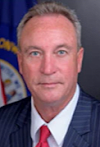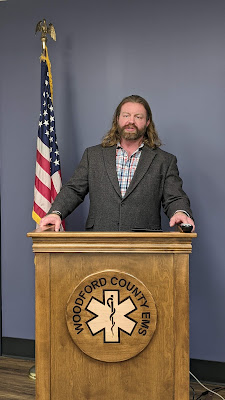 |
| Slide from Office of the Attorney General; click it to enlarge |
Kentucky Health NewsKentucky's local and state governments continue to reap more millions from settlements with drug manufacturers and distributors, and are looking for guidance on how to spend the money to provide relief from the opioid epidemic, as the settlements require.
The state is getting $842 million, half of which will be allocated by the state Opioid Abatement Advisory Commission, with the other half going to cities and counties. Funds are to be disbursed annually, on various schedules, through 2038.
The head of the commission, appointed by Attorney General Daniel Cameron, envisions a practical, strategic, "flexible and dynamic" process. Gov. Andy Beshear and one of his appointees who serves on the commission want firmer guidelines and a scoring system for grant applications.
At the commission's Jan. 10 meeting, its treatment and recovery subcommittee set the calendar to start making recommendations for the grant awards, and some members said they need formal guidelines, such as scoring rubrics.
One member said it would be important for the group as a whole to be working from the same guidance. Another said such guidance would allow for transparency and consistency in the selection process.
 |
| Van Ingram |
The next treatment and recovery subcommittee meeting is Feb. 7. Ingram said, "If we don't have the guidance before Feb. 7 or on Feb. 7, I don't think we need to be making any decisions. We can discuss. We can look at. But . . . we don't want to make decisions and then the guidance come later."
Ingram works for Beshear, a Democrat who is seeking re-election. One of the Republicans running for his job is Cameron, who named lawyer Bryan Hubbard chair and executive director of the Opioid Abatement Advisory Commission.
Hubbard was asked Jan. 19 if the guidance Ingram wanted would be forthcoming. He said, "This is not a process by which we can use strict, academically developed, rigid rubrics to assess the viability of a project. We've got to think practically, strategically. And we've got to be able to recognize what is going on, on the ground, so that we can deliver the necessary resources to advise good work that's being done. The application process that we've come up with gives us the due-diligence tools to ensure we have competent qualified organizations who can participate, and we aim to resource as many of them as well possibly can."
Meanwhile, Kentucky Health News asked Beshear at his regular weekly news conference if he shared Ingram's concerns, and he said he did. "Certainly any process where there's an application for government funds, has to have guidelines, has to have scoring criteria," he said, adding later, "That is a great concern that they have taken all of these applications without giving organizations . . . the scoring criteria that will be used. So my hope is that we'll see some major changes."Beshear alluded to the election: "This isn't about me or anybody else in office; this is about wanting to make sure that this money, which is blood money, is used the right way, is used the smart way. And if they don't come up with criteria, how are they going to tell all the amazing organizations that there might not be enough funding for in this round why? . . . They're going to need an explanation about why one thing was funded and another wasn't early on."
 |
| Bryan Hubbard (Photo by Melissa Patrick) |
Hubbard told the Health and Senate Health Services committees Jan. 19 that the commission had received 32 completed grant applications and that 231 more are in progress. He said the total asked by the completed applications is $63.6 million.
Local officials also seek guidance“I can tell you already that we’ve already had ideas that people [say], 'I don't know if that fits the statute',” Kay said.
Hubbard told Kay, “Insofar as that's an idea that your fellow judge-executives would be receptive to, we would love to assist in any way you think is helpful.”
A few days later, Hubbard told Kentucky Health News, "We want to be supportive without being dictatorial. And insofar as there is anyone within local leadership across the state that wants us to bless anything, it's not a necessity, but we're happy to do it with him."
 |
| For a larger version of the chart, click on it. |
He added, "Within the Black community we don’t see us as having a problem. Even though somebody just took a pill their aunt was prescribed. They just took the pill because they had back pain. Then they went back again. Then again. And after that, they just can’t stop going back."
Hubbard told the health committees that common themes in the 11 town hall meetings have been the need for increased prevention programs for youth, creation of recovery support programs, recovery housing, transportation, second-chance employment, expungement of criminal records, acute-phase treatment with seamless transitions to treatment, and addressing the stigma that plagues this disease.
"In our town-hall meetings, it is very clear that Kentuckians wish for those of us who hold public trust to understand the depth and just the immense dimension of pain that exists in the state, that has been produced by this epidemic," Hubbard said. "We are losing a small town a year and have been for at least a decade."
from KENTUCKY HEALTH NEWS http://kyhealthnews.blogspot.com/2023/01/governor-wants-firm-guidelines-on-how.html Governor wants firm guidelines on how to spend opioid settlement money, now up to $842 million; Cameron appointee says noHealthy Care
0 Response to "Governor wants firm guidelines on how to spend opioid settlement money, now up to $842 million; Cameron appointee says noHealthy Care"
Post a Comment